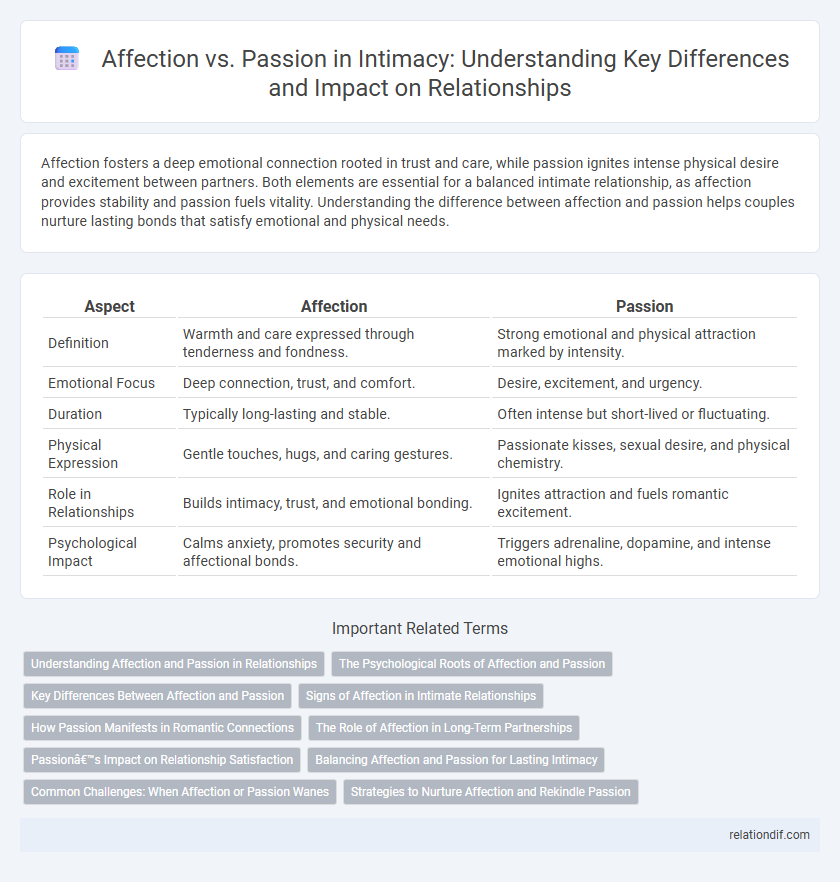Affection fosters a deep emotional connection rooted in trust and care, while passion ignites intense physical desire and excitement between partners. Both elements are essential for a balanced intimate relationship, as affection provides stability and passion fuels vitality. Understanding the difference between affection and passion helps couples nurture lasting bonds that satisfy emotional and physical needs.
Table of Comparison
| Aspect | Affection | Passion |
|---|---|---|
| Definition | Warmth and care expressed through tenderness and fondness. | Strong emotional and physical attraction marked by intensity. |
| Emotional Focus | Deep connection, trust, and comfort. | Desire, excitement, and urgency. |
| Duration | Typically long-lasting and stable. | Often intense but short-lived or fluctuating. |
| Physical Expression | Gentle touches, hugs, and caring gestures. | Passionate kisses, sexual desire, and physical chemistry. |
| Role in Relationships | Builds intimacy, trust, and emotional bonding. | Ignites attraction and fuels romantic excitement. |
| Psychological Impact | Calms anxiety, promotes security and affectional bonds. | Triggers adrenaline, dopamine, and intense emotional highs. |
Understanding Affection and Passion in Relationships
Affection in relationships is characterized by warmth, care, and emotional closeness that fosters a secure bond and long-term connection. Passion involves intense feelings of desire and attraction, often marked by physical intimacy and excitement that ignite the relationship's energy. Balancing affection and passion is essential for sustaining both emotional depth and physical vitality in healthy partnerships.
The Psychological Roots of Affection and Passion
Affection stems from psychological needs for security, trust, and emotional connection, often rooted in early attachment experiences and the development of empathy. Passion is driven by biological impulses related to desire, attraction, and arousal, influenced by hormonal activity such as dopamine and testosterone. Understanding these distinct psychological roots clarifies how affection fosters long-term bonding while passion ignites intense but often short-term romantic engagement.
Key Differences Between Affection and Passion
Affection involves a deep sense of care, warmth, and emotional connection characterized by consistent support and comfort, whereas passion is marked by intense physical attraction, excitement, and a desire often fueled by novelty and arousal. Affection fosters long-term bonding through trust and understanding, while passion tends to ignite quickly, driven by emotional and physiological intensity. Understanding these distinctions helps differentiate a stable, nurturing relationship from one based on fiery, transient emotions.
Signs of Affection in Intimate Relationships
Signs of affection in intimate relationships include consistent physical touch, such as holding hands or gentle caresses, and verbal expressions like compliments and words of appreciation that foster emotional connection. Acts of kindness and attentiveness, such as remembering personal details and offering support during difficult times, reinforce feelings of safety and trust. These expressions deepen intimacy by creating a nurturing environment that prioritizes emotional closeness over transient physical desire.
How Passion Manifests in Romantic Connections
Passion in romantic connections manifests through intense emotional and physical attraction, often characterized by a heightened desire for closeness and stimulation. It drives spontaneous actions and a deep longing for union with the partner, creating a sense of excitement and urgency. Unlike affection, which grows steadily over time, passion can ignite quickly and fuel the initial intensity of romantic relationships.
The Role of Affection in Long-Term Partnerships
Affection plays a crucial role in sustaining long-term partnerships by fostering emotional security, trust, and mutual respect. Unlike passion, which can fluctuate and diminish over time, consistent affectionate behaviors such as physical touch, verbal affirmations, and acts of kindness create a stable foundation for enduring intimacy. Research indicates that couples prioritizing affection experience higher relationship satisfaction and resilience through life's challenges.
Passion’s Impact on Relationship Satisfaction
Passion drives intense emotional and physical connection, directly influencing relationship satisfaction by fostering excitement and desire between partners. High levels of passion correlate with increased romantic fulfillment, enhancing overall intimacy and motivation to maintain the bond. However, sustainable relationship satisfaction often requires balancing passion with affection and commitment for deeper emotional stability.
Balancing Affection and Passion for Lasting Intimacy
Balancing affection and passion is essential for lasting intimacy, as affection fosters emotional security while passion ignites physical connection. Couples who nurture both elements often experience deeper trust and sustained desire over time. Sustaining affection through consistent gestures and maintaining passion through shared experiences creates a harmonious relationship dynamic.
Common Challenges: When Affection or Passion Wanes
Affection and passion often face common challenges as time passes, including diminished emotional connection and reduced physical desire. Couples may struggle with maintaining consistent expressions of love or reigniting the initial intensity that characterized early stages. Addressing these issues requires intentional communication and shared experiences to sustain both tenderness and excitement in the relationship.
Strategies to Nurture Affection and Rekindle Passion
Nurturing affection involves consistent emotional support, active listening, and small daily gestures like compliments or shared activities that build trust and closeness. Rekindling passion requires introducing novelty through date nights, physical touch, and open communication about desires to reignite attraction and excitement. Combining these strategies strengthens emotional bonds and revitalizes physical intimacy in long-term relationships.
Affection vs passion Infographic

 relationdif.com
relationdif.com